Work Permit Extension in Canada
Trusted Immigration Law Expertise
Over 25 years of experience helping clients navigate Canada’s complex immigration system
Timely Work Permit Renewals
Assistance with submitting complete and accurate extension applications before expiry.
Multilingual Legal Team
Services are available in multiple languages to support clients from diverse backgrounds.
Client-Focused Service
4.9-star Google rating based on hundreds of satisfied client reviews.
Work Permit Extension In Canada
Planning to continue your professional journey in the Great White North? If your current Canadian temporary work permit is nearing its expiration, understanding the process for a work permit extension in Canada is crucial. As you know, a Canadian temporary work permit issued by Immigration, Refugees and Citizenship Canada (IRCC) provides the legal authorization for foreign nationals to work within Canada for a defined period. While distinct from a visa, which grants entry to the country, this permit is indispensable for employment.
The terms and duration of these permits can vary considerably depending on factors such as the job itself and the designated employer. Typically valid for a timeframe ranging from several months to a number of years, some permits are tied to a specific employer, while others offer more flexibility.
To ensure your continued ability to work and reside legally in Canada, it’s vital to understand how to extend your work permit in Canada. Working without valid authorization can lead to severe repercussions, including deportation and future restrictions on entering Canada.
Similarly, Canadian employers have a legal obligation to verify the work authorization of their employees and face penalties for non-compliance. Maintaining your legal work status not only ensures your right to work but also safeguards your access to fundamental rights and protections under Canadian labor laws.
Navigating the requirements for a work permit extension and understanding the options for work visa extensions are, therefore, essential steps for a secure and compliant stay in Canada.
When to Consider Extending Your Work Permit or Changing Your Work Permit
So, when should you consider extending or changing your work permit? Well, there are a few situations that might prompt this decision.
Job Extension or Change
If you plan to continue working in the same job with your current employer, you might need to extend your work permit in Canada to reflect that. If you plan to move to a different job, however, you may need to apply for a new work permit altogether, depending on the situation. This often comes up if your job duties or employer have changed in any significant way.
New Job Offer
Receiving a new job offer while you’re in Canada on a work permit usually means you’ll need to either extend or renew your work permit in Canada or apply for a new one. This is especially true if the job offer involves changing your role or employer. The process can be pretty simple if you are transitioning within the same field, but it’s still an important detail to keep track of.
Transition to Permanent Residence
Many foreign workers in Canada have the goal of eventually transitioning to permanent residency. If you want to extend your work permit in Canada while pursuing this goal, it’s essential to know that some programs allow you to do so. In fact, staying longer on a work permit can sometimes be part of the path to Canadian permanent residency.
Leaving and Re-entering Canada
If you’re considering a trip outside of Canada and intend to resume working upon your return, it’s essential to ensure your work permit is up-to-date. This proactive step , along with a valid temporary resident visa , safeguards your legal right to work and facilitates a seamless re-entry into the country.
Who Can Apply for a Canada Work Visa Extension?
If your current Canadian work permit is nearing its expiry date and you wish to continue working and residing in Canada, applying for a work visa extension is a necessary step. Generally, individuals holding a valid Canadian Work Permit and Visas who want to extend their stay and employment in Canada beyond the current permit’s validity are eligible to apply for a Canada work permit extension.
It’s important to note that if you hold a Temporary Foreign Worker Program (TFWP) work permit, which is typically an employer-specific or “closed” work permit, you might also need to request changes to the conditions of your permit when you apply for an extension. This could be necessary if:
- Your current job role has changed significantly, such as in terms of salary or responsibilities.
- Your current employer has offered you a new position.
- You have received a job offer from a different employer.
A significant benefit of applying for an extension before your current permit expires and while you remain in Canada is the concept of “maintained status.” This means that from the moment IRCC receives your application, you are legally authorized to continue working under the same conditions as your existing work permit until a decision is made on your extension application.
However, it’s crucial to understand that a maintained status only allows you to continue in your current role under the existing permit’s conditions; you cannot begin a new job on a TFWP work permit until your new permit is officially approved. Immigration, Refugees and Citizenship Canada (IRCC) advises applicants to submit their application for a work permit extension at least 30 days before their current permit is set to expire.
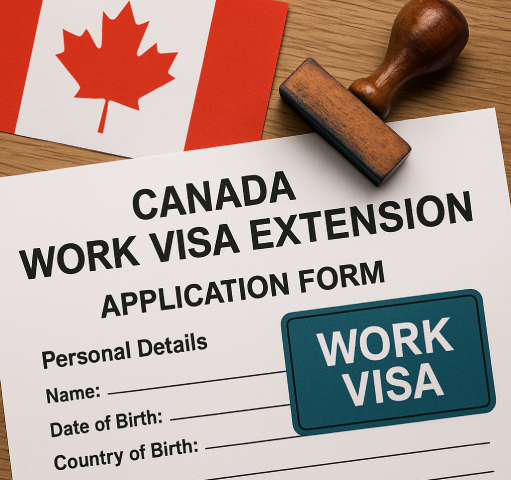
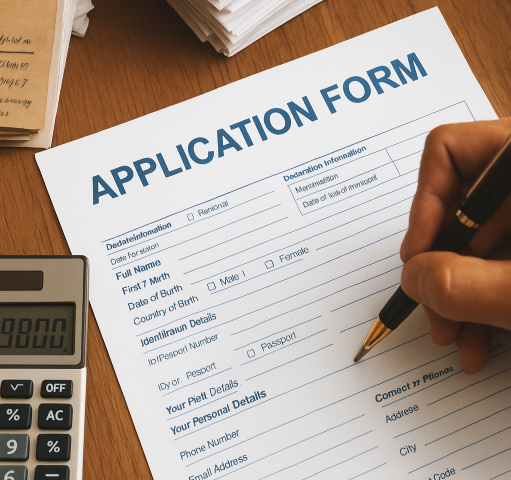
How to Apply to Extend Your Work Permit in Canada?
If you want to keep working in Canada after your current work permit ends, you’ll usually need to change the details of your existing permit. Applying to extend or renew a work permit in Canada is usually a simple process that takes a few steps.
To be able to extend or renew your work permit in Canada, you need to meet certain requirements. You will likely need to:
- Currently have a valid Canadian work permit and have followed all the rules of that permit.
- Be married to someone who has a valid Canadian study or work permit.
- Have a valid Temporary Resident Permit.
- Be allowed to work in Canada without a specific permit.
- Be a refugee or someone applying for permanent residence in Canada, under section 207 of the IRPR.
- Be in Canada as a trader, investor, transferred employee, or professional under the Canada-United States-Mexico Agreement (CUSMA).
It’s a good idea to get advice from a lawyer to determine whether you are eligible and how to renew your work permit in Canada.
Step-By-Step Guide To Extension Of Work Permit
So, you’ve decided to apply for an extension. What comes next? Here’s a quick rundown of the steps involved in the Canada work permit extension process.
Step 1: Determine Eligibility
Before you begin the application process, it’s vital to confirm that you meet the necessary criteria for a work permit extension. Generally, you will need to:
- Hold a work permit that is still valid or has recently expired (in which case, you might be eligible for restoration of status under specific conditions).
- Intend to continue working in the same role for the same employer as specified on your current permit (unless you are also applying for a change of conditions).
- Currently residing in Canada with valid status (not as a visitor).
Additionally, it’s important to ensure there are no underlying issues, such as a criminal record or significant health concerns, that could negatively impact your eligibility. If you have any doubts about your situation, seeking guidance from an immigration professional is recommended.


Step 2: Gather Required Documents
Gathering all the required documentation is a critical step. Typically, you will need the following:
- A clear copy of your existing work permit.
- A formal job offer letter or employment contract from your current employer.
- Proof of your ongoing employment, such as recent pay stubs or a letter of confirmation from your employer.
- Your valid passport, ensuring it has sufficient validity remaining (ideally at least six months).
- Any additional documents that Immigration, Refugees and Citizenship Canada (IRCC) may request based on your specific circumstances.
Tips for ensuring all documents are complete and accurate:
- Accuracy: Double-check every detail on all your documents.
- Up-to-date Information: Ensure all documents are current and valid.
- Translation: If any of your documents are not in English or French, provide certified translations.
It’s worth noting that switching from a visitor visa to a work permit can be a bit more complicated, and extra documentation might be required. The important thing is to be as thorough as possible to avoid any delays or issues.
Step 3: Submit the Application
Once you have all your documents ready, you can submit your application through one of two methods: online or by mail.
Online Application:
- Create an account or log in to your existing account on the official IRCC website.
- Complete the online application form accurately and upload all your supporting documents in the required formats.
- Pay the applicable work permit extension processing fee (currently around $155 CAD).
- Submit your completed application electronically.
Paper Application:
- Download the work permit extension application form from the IRCC website.
- Fill out the form completely and gather all your supporting documents.
- Mail your entire application package to the designated IRCC mailing address.
- Include proof of payment for the work permit processing fee.
Work Permit Fee Details:
The standard processing fee is approximately $155 CAD.
If applicable, you may also need to pay a separate fee for biometrics (currently $85 CAD).
Chaudhary Law can help ensure that your application is filed correctly and on time, especially if you’re unsure about the specifics of the paperwork.


Step 4: After Submission
After submitting your application, you can expect the following:
- Processing Times: The time it takes for IRCC to process work permit extensions can vary. It typically ranges from several weeks to a few months. Keep an eye on the estimated processing times published on the IRCC website. In certain situations, expedited processing might be available.
- Maintained (Implied) Status: If you submitted your extension application before your original work permit expired and remain in Canada, you may be granted “maintained status” (formerly known as “implied status”). This allows you to continue working under the same conditions as your previous work permit while your new application is being processed.
- Communication and Updates: IRCC will communicate with you via email or through your online account regarding the status of your application. If they require additional information or documentation, it’s crucial to respond promptly to avoid any delays in processing.
By carefully following these steps and ensuring your application is complete and accurate, you can navigate the process of work visa extension in Canada effectively, allowing you to continue your professional journey without interruption.
How Much Does It Cost to Extend a Work Permit in Canada?
The expense associated with extending your work permit in Canada can vary depending on the specific type of work permit you are applying for and your individual circumstances. Below is a breakdown of the standard fees levied by Immigration, Refugees and Citizenship Canada (IRCC) for work permit extensions:
| Work Permit Extension Fees | Cost (CAD) |
| Work Permit Extension (Per Person) | $155 |
| Open Work Permit Holder Fee (If Applicable) | $100 |
| Biometrics (Per Person) | $85 |
| Biometrics (Per Family – 2 or More Applicants) | $170 |
| Restoration of Status (If Work Permit Has Expired) | $200 + $155 (New Work Permit Fee) |

30
Years of experience

1000+
Successful Visa Grants

80%
Appeal Success Rate

2
Languages: English and Mandarin
Additional Costs to Consider
Beyond the direct processing fees charged by IRCC, you might encounter additional costs depending on your specific circumstances and the type of work permit you hold or are applying for:
Employer Compliance Fee ($230)
If your work permit is employer-specific, your employer may be required to submit an offer of employment through the IRCC Employer Portal and pay a compliance fee of $230 CAD. This fee is typically the responsibility of the employer.
Labour Market Impact Assessment (LMIA) Fees ($1,000)
In some cases, your employer might need to obtain a Labour Market Impact Assessment (LMIA) from Employment and Social Development Canada (ESDC) to support your work permit application. The fee associated with the LMIA application is currently $1,000 CAD and is generally paid by the employer.
Medical Examination Fees (Approximately $150-$250)
Depending on your country of origin and personal health history, IRCC may request that you undergo a new medical examination as part of your work permit extension process. The cost of these medical exams can range from approximately $150 to $250 CAD, but this can vary depending on the clinic and the specific tests required.
Legal or Consultant Fees
If you seek professional assistance from an immigration consultant or lawyer to help you with your work permit extension application, you will need to factor in their service fees. These fees can vary significantly based on the complexity of your case and the professional’s rates.
Chaudhary Law can provide clear and precise details on the fees involved, helping you avoid unexpected costs as you go through the process.
What Is the Processing Time for a Work Permit Extension in Canada?
The time it takes to process a work permit extension in Canada is not fixed and can fluctuate based on several key factors. These include the specific category of your work permit, your current place of residence (whether you are applying from within Canada or from abroad), and the current processing load at Immigration, Refugees and Citizenship Canada (IRCC).
Understanding these variables can help you set realistic expectations and plan your extension application accordingly to minimize potential disruptions.
Processing Times Based on the Type of Work Permit
Different types of work permit extensions often have varying processing timelines. Here are some general estimates for online applications:
Employer-Specific Work Permit Extension:
Applications to extend a work permit tied to a particular employer typically take around 90 to 120 days.
Open Work Permit Extension
Extensions for open work permits, such as those granted to spouses or common-law partners of certain temporary residents or international students, generally require 90 to 130 days for processing.
Post-Graduation Work Permit (PGWP) Extension
If you are eligible for an extension of your Post-Graduation Work Permit under any special temporary measures or public policies, processing times can vary but often fall within the range of 100 to 140 days due to potentially high application volumes.
To avoid legal complications, it’s a good idea to apply for an extension well in advance of your permit’s expiration date.
Services

Permanent Residence
such as Family sponsorship, Express Entry programs (Federal Skilled Workers, Canadian Experience Class), Provincial Nominee Programs, Business and Investment Immigration to Canada

Refugee Protection
Refugee Protection and Person in Need of Protection in Canada. Get assistance from one of the best Refugee lawyers in Toronto.

Interpol Data Search and Correction Request
Some individuals may be concerned that information about them is contained within the information system of Interpol.

Appeals
which included the Immigration Appeal Division and the Refugee Appeal Division

Inadmissibility
such as criminality, misrepresentation and medical reasons.

Name Change in Ontario
In Ontario you can Apply for a Name Change if you are 16 years of age or older and you have lived for the past 12 months in the Province of Ontario

Judicial Review
Judicial Review at the Federal Court, refused applications outside of Canada, no right of appeal and refused Appeals

Temporary Residence
such as Visitor Visa’s, Study permits and Work Permit’s to Canada

Citizenship
A Canadian passport is highly prized. It facilitates ease of entry into many countries both developed and benighted.

Notary Services
Notarization and Certification of Documents Services Offered.
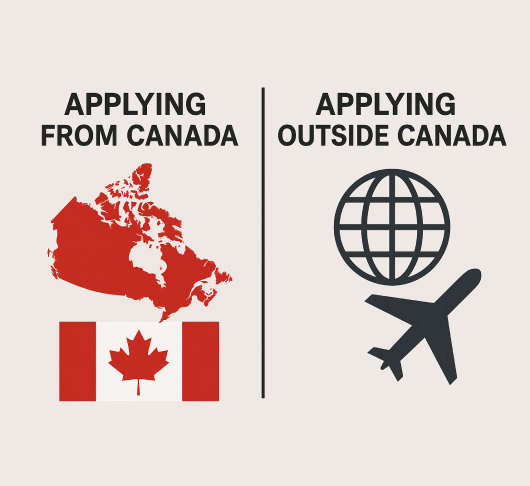
Impact of Your Country of Residence
Where you are applying from can significantly affect processing times.
- Applying from within Canada: Applications submitted while you are already in Canada are usually processed by domestic IRCC offices, which often have more streamlined timelines.
- Applying from outside Canada: If you are submitting your extension application from outside of Canada, the processing time can vary considerably depending on your country of residence and the workload of the specific visa application center or embassy handling your case. For instance, applicants from countries like the United States or Europe may experience shorter processing times compared to those applying from regions such as Africa or South Asia, where application backlogs might be more common. Countries with a high volume of applicants, such as India, Nigeria, and the Philippines, may also see longer processing times.
Influence of IRCC Processing Volumes and Seasonal Factors
The overall efficiency of IRCC’s processing can also be influenced by:
- Peak Application Periods: During busy immigration seasons, such as the summer months (May to August) and around the start of the academic year in September, the volume of applications increases, leading to longer processing times.
- Changes in Government Policy: The introduction of new immigration programs or adjustments to existing policies can temporarily impact processing speeds as IRCC adapts to these changes.
- Incomplete Applications: Submitting an incomplete application with missing documents or errors is a significant factor that can cause substantial delays or result in requests for further information, thereby extending the overall processing time.

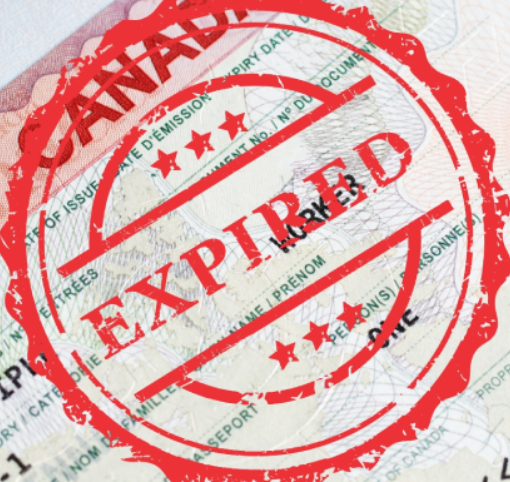
What to Do if Your Canadian Work Permit Has Expired?
If your Canadian work permit has expired, the steps you need to take depend on whether you submitted an application for an extension before the expiry date.
-
If You Applied for an Extension Before Your Permit Expired:
If you applied to extend or change the conditions of your work permit before it reached its expiry date, you are legally allowed to remain in Canada under what is known as “maintained status” (formerly “implied status”) until a decision is made on your application. This means you can generally continue working under the same conditions as your previous work permit while you await the outcome of your extension application.
-
If Your Permit Expired Before You Applied:
If your work permit has expired and you did not submit an application for a new work permit, a study permit, or a visitor visa before the expiry date, or if you failed to comply with the conditions of your permit, you must stop working immediately if you are still in Canada.
Continuing to work without a valid work permit has serious consequences and can jeopardize your future ability to stay in Canada.
Leaving and Re-entering Canada
If you have plans to travel outside of Canada and intend to return to continue working, it’s essential to ensure your work permit remains valid. Updating your work permit before you leave, if it is nearing its expiry, is a critical step in maintaining your legal work status in Canada and facilitating a seamless re-entry.
To avoid complications upon your return, always apply for a work permit extension well before your current permit expires. This proactive approach ensures that you remain compliant with Canadian immigration regulations and prevents any breaks in your legal authorization to work. By being timely with your applications, you can maintain focus on your professional and personal goals, knowing that your work status in Canada is secure and uninterrupted.
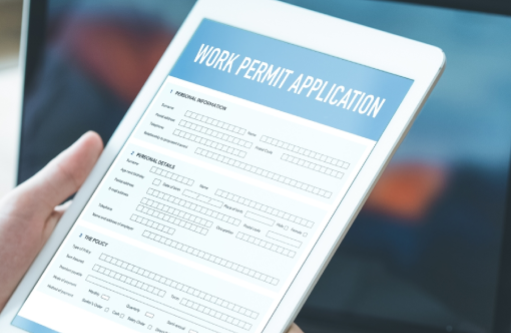
Testimonials

Working in Quebec: Special Considerations
Employment in Quebec comes with its own set of specific considerations, primarily due to the province’s distinct immigration agreements. If you want to work in Quebec, the Labour Market Impact Assessment (LMIA) process involves an extra layer compared to other Canadian provinces. Before an employer can apply for an LMIA to hire a foreign worker, they typically need to secure a Quebec Acceptance Certificate from the Quebec government. This step ensures the proposed employment aligns with Quebec’s specific labor market demands and priorities.
When it comes to the work permit extension in Quebec, the process can also have slight variations compared to other provinces. It’s crucial to understand that you will likely need to renew both your federal work permit and your Quebec CAQ. Ensuring that you meet all the specific requirements set forth by the Quebec government for the CAQ renewal is a vital part of the overall work permit extension process in the province.
Staying up-to-date on any changes or updates to Quebec’s immigration policies and procedures is highly recommended to prevent potential delays or complications with your application. Navigating the requirements for working and extending your work permit in Quebec requires attention to both federal and provincial regulations.
Frequently Asked Questions
Can I extend my work permit before it expires?
How much does it cost to extend a work permit in Canada?
Who can apply for an 18-month work permit extension?
How many times can a Canadian work permit be extended?
Can I extend my work permit after it expires?
Is it easy to get a work permit extension in Canada?
Consulting an Immigration Lawyer for a Work Permit Extension
In Canada, the work permit extension process can be complicated, but you don’t have to navigate it alone. Consulting with an immigration lawyer, such as the team at Chaudhary Law, can provide you with expert guidance throughout the entire process. We can help ensure that your application is filed correctly, all required documents are submitted, and you comply with Canadian immigration law every step of the way. Call 416-447-6118 for more information.
We Have a Great Resource




